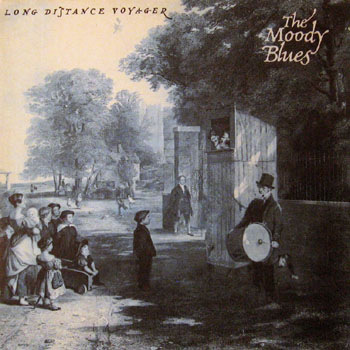
Long Distance Voyager by The Moody Blues (1981)
Long Distance Voyager is a forgotten treasure, a gleaming gem in the junk pile of washed-up progressive rock bands from the 70s who struggled to stay relevant in the 80s. It's not exactly what you would call a masterpiece, but hey, good enough for this column. You get to pick your favorites, and I get to pick mine. That's the way it works, junior.
If you were to hold a copy of this album or CD in your hands, the first thing you would notice is the stunning cover illustration, which depicts a man with a big drum and a harmonica, entertaining a crowd of people in a small village in what appears to be 19th century England. The artwork was definitely what first drew me to the album when I discovered it in the early 80s.
Like Saturday Night Fever, this is another one of those records that I borrowed from my sister and somehow failed to return. I was not a huge Moody Blues fan, but I remember listening to Long Distance Voyager and thinking, "Hey, this is not bad at all," and then going back to my Pink Floyd and Steely Dan records.
What sets this record apart from others is the painstaking care that went into the production, engineering, and song arrangements. It's pretty much ear candy from start to finish. Also impressive is the fact that four of the five band members wrote songs on this album. This is a surprisingly collaborative effort by a band that had been around for a while, whom you might have thought would be running out of ideas.
The album opens with Justin Hayward's "The Voice," which has a very 80s sound and incorporates electronic keyboards not unlike what you would have heard on a Cars album from around that time. The lyrics consist of the kind of vague philosophical pronouncements that had always paid the band's bills: "Each and every heart, it seems, is bounded by a world of dreams." The slightly more substantial "Talking Out of Turn" by John Lodge, is a nicely understated mid-tempo piece about a love affair gone bad. Apparently, the lyricist had been trying to rekindle a relationship, but instead finds himself "shot to pieces" by the lady in question. The song features a smorgasbord of multi-tracked instrumentation, including an interesting string arrangement. Definitely one of my favorites on this record.
I would imagine that rock critics who reviewed this album back in 1981 probably used adjectives like "vapid," "sterile," "syrupy," and "slick and overproduced." That's a pretty accurate description of the album's radio hit, the inanely cheerful and upbeat "Gemini Dream," which I love for those exact same reasons. The song is so naive in spirit, so unencumbered by the doom and gloom of our current age that it sounds like music from another planet.
A moment of brilliant juxtaposition is presented by the fourth song, "In My World," a bittersweet love song completely opposite in mood to "Gemini Dream," with a slow hypnotic rhythm and ghostly steel guitars. Hayward proclaims, "It's heaven on earth when you're close to me," but the music seems to hint that he's on the road to inevitable heartbreak. The song ends with an extended instrumental jam and the sound of an angelic choir.
Side two of the album presents some interesting challenges to those hoping that it would be as masterfully conceived as the first side. "Meanwhile" and "Nervous" find the Moodies slipping unabashedly into the muck of adult contemporary music.
The last few songs are a half-hearted attempt to cobble together a conceptual theme, loosely based on the album cover. "Painted Smile" revisits familiar lyrical territory with its portrayal of a broken-hearted clown (recalling the old 60s chestnuts "Tears of a Clown" by Smokey Robinson and "Everybody Loves a Clown" by Gary Lewis and the Playboys, respectively).
"22,000 Days," written by drummer Graeme Edge, is another favorite of mine, and could easily pass as a song by an early-80s band like XTC or Split Enz. This song gives a little taste of what The Moody Blues might have sounded like if they had thoroughly re-invented themselves the way Genesis did. The lyrics establish a theme of mortality which recurs later on the album: "It's not a lot, it's all you've got, 22,000 days."
The closing song, "Veteran Cosmic Rocker," is fairly blatant rip-off of Emerson, Lake, and Palmer's "Karn Evil 9: 1st Impression, Pt. 2," the one that begins with, "Welcome back, my friends, to the show that never ends." The lyrics express the tedium of being a touring rock star. The head-scratching final lyric of the song, "He's the veteran cosmic rocker, he's afraid that he will die," is belted out with impressive intensity and leaves the listener with many questions. Did the members of The Moody Blues expect to live forever? Were they secret alchemists who spent their nights in a basement laboratory trying to invent a serum of immortality? Is it possible that they succeeded in stopping their own aging processes, and are currently living off the grid the way vampires do -- moving from place to place and changing their identities every so often so that nobody notices that they aren't getting any older?
If all of that is true, I've probably already written too much, and one of these days I might get a knock on the door from a couple of middle-aged British guys and never be heard from again.
Reviewed by Somebody 12/1/11
See more Favorite Albums of the Moment





